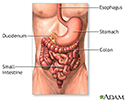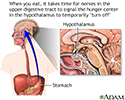Appetite - increased
Hyperphagia; Increased appetite; Hunger; Excessive hunger; PolyphagiaIncreased appetite means you have an excess desire for food.
Considerations
An increased appetite can be a symptom of different diseases. For example, it may be due to a mental condition or a problem with an endocrine gland.
Endocrine gland
Endocrine glands release (secrete) hormones into the bloodstream. The endocrine glands include:AdrenalHypothalamusIslets of Langerhans in the pancrea...

An increased appetite can come and go (intermittent), or it can last for long periods of time (persistent). This will depend on the cause. It does not always result in weight gain.
The terms "hyperphagia" and "polyphagia" refer to someone who is focused only on eating, or who eats a large amount before feeling full.
Causes
Causes may include:
-
Anxiety
Anxiety
Stress is a feeling of emotional or physical tension. It can come from any event or thought that makes you feel frustrated, angry, or nervous. Stres...
 ImageRead Article Now Book Mark Article
ImageRead Article Now Book Mark Article - Certain medicines (such as corticosteroids, cyproheptadine, and tricyclic antidepressants)
-
Bulimia (most common in women 18 to 30 years old)
Bulimia
Bulimia is an eating disorder in which a person has regular episodes of eating a very large amount of food (bingeing) during which the person feels a...
 ImageRead Article Now Book Mark Article
ImageRead Article Now Book Mark Article -
Diabetes mellitus (including gestational diabetes)
Diabetes mellitus
Diabetes is a long-term (chronic) disease in which the body cannot regulate the amount of sugar in the blood.
 ImageRead Article Now Book Mark Article
ImageRead Article Now Book Mark ArticleGestational diabetes
Gestational diabetes is high blood sugar (glucose) that starts or is first diagnosed during pregnancy.
 ImageRead Article Now Book Mark Article
ImageRead Article Now Book Mark Article -
Graves disease
Graves disease
Graves disease is an autoimmune disorder that leads to an overactive thyroid gland (hyperthyroidism). An autoimmune disorder is a condition that occ...
 ImageRead Article Now Book Mark Article
ImageRead Article Now Book Mark Article -
Hyperthyroidism
Hyperthyroidism
Hyperthyroidism is a condition in which the thyroid gland makes too much thyroid hormone. The condition is often called overactive thyroid.
 ImageRead Article Now Book Mark Article
ImageRead Article Now Book Mark Article -
Hypoglycemia
Hypoglycemia
Low blood sugar is a condition that occurs when the body's blood sugar (glucose) decreases and is too low. Blood sugar below 70 mg/dL (3. 9 mmol/L) i...
 ImageRead Article Now Book Mark Article
ImageRead Article Now Book Mark Article -
Premenstrual syndrome
Premenstrual syndrome
Premenstrual syndrome (PMS) refers to a wide range of symptoms. The symptoms start during the second half of the menstrual cycle (14 or more days af...
 ImageRead Article Now Book Mark Article
ImageRead Article Now Book Mark Article
Home Care
Emotional support is recommended. Counseling may be needed in some cases.
If a medicine is causing increased appetite and weight gain, your health care provider may decrease your dose or have you try another medicine. Do not stop taking your medicine without talking to your provider.
When to Contact a Medical Professional
Contact your provider if:
- You have an unexplained, persistent increase in appetite
- You have other unexplained symptoms
What to Expect at Your Office Visit
Your provider will do a physical exam and ask questions about your medical history. You also may have a psychological evaluation.
Questions may include:
- What are your typical eating habits?
- Have you begun dieting or do you have concerns about your weight?
- What medicines are you taking and have you recently changed the dose or started new ones? Do you use any illicit drugs?
- Do you get hungry during sleep? Is your hunger related to your menstrual cycle?
- Have you noticed any other symptoms such as anxiety, palpitations, increased thirst, vomiting, frequent urination, or unintentional weight gain?
Palpitations
Palpitations are feelings or sensations that your heart is pounding or racing. They can be felt in your chest, throat, or neck. You may:Have an unpl...
 ImageRead Article Now Book Mark Article
ImageRead Article Now Book Mark ArticleIncreased thirst
Excessive thirst is an abnormal feeling of always needing to drink fluids.
 ImageRead Article Now Book Mark Article
ImageRead Article Now Book Mark ArticleVomiting
Nausea is feeling an urge to vomit. It is often called "being sick to your stomach. "Vomiting or throwing-up forces the contents of the stomach up t...
 ImageRead Article Now Book Mark Article
ImageRead Article Now Book Mark ArticleFrequent urination
Frequent urination means needing to urinate more often than usual. Urgent urination is a sudden, strong need to urinate. This causes a discomfort i...
 ImageRead Article Now Book Mark Article
ImageRead Article Now Book Mark Article
- Blood tests, including a chemistry profile
-
Thyroid function tests
Thyroid function tests
Thyroid function tests are used to check whether your thyroid is working normally. The most common thyroid function tests are:Free T4 (free thyroxine...
 ImageRead Article Now Book Mark Article
ImageRead Article Now Book Mark Article
References
Clemmons DR, Nieman LK. Approach to the patient with endocrine disease. In: Goldman L, Cooney KA, eds. Goldman-Cecil Medicine. 27th ed. Philadelphia, PA: Elsevier; 2024:chap 202.
Jensen MD, Bessesen DH. Obesity. In: Goldman L, Cooney KA, eds. Goldman-Cecil Medicine. 27th ed. Philadelphia, PA: Elsevier; 2024:chap 201.
Katzman DK, Norris ML. Feeding and eating disorders. In: Feldman M, Friedman LS, Brandt LJ, eds. Sleisenger & Fordtran's Gastrointestinal and Liver Disease. 11th ed. Philadelphia, PA: Elsevier; 2021:chap 9.
-
Lower digestive anatomy - illustration
Food passes from the stomach into the small intestine. In the small intestine all nutrient absorption occurs. Whatever has not been absorbed by the small intestine passes into the colon. In the colon most of the water is absorbed from the food residue. The residue is then eliminated from the body as feces.
Lower digestive anatomy
illustration
-
Hunger center in brain - illustration
It takes time for the body to recognize that you have eaten and for the feeling of hunger to go away. Eating too quickly may cause you to eat more food over the same period of time as eating slowing and allowing your body to feel full.
Hunger center in brain
illustration
-
Lower digestive anatomy - illustration
Food passes from the stomach into the small intestine. In the small intestine all nutrient absorption occurs. Whatever has not been absorbed by the small intestine passes into the colon. In the colon most of the water is absorbed from the food residue. The residue is then eliminated from the body as feces.
Lower digestive anatomy
illustration
-
Hunger center in brain - illustration
It takes time for the body to recognize that you have eaten and for the feeling of hunger to go away. Eating too quickly may cause you to eat more food over the same period of time as eating slowing and allowing your body to feel full.
Hunger center in brain
illustration
Review Date: 10/9/2024
Reviewed By: Linda J. Vorvick, MD, Clinical Professor, Department of Family Medicine, UW Medicine, School of Medicine, University of Washington, Seattle, WA. Also reviewed by David C. Dugdale, MD, Medical Director, Brenda Conaway, Editorial Director, and the A.D.A.M. Editorial team.




